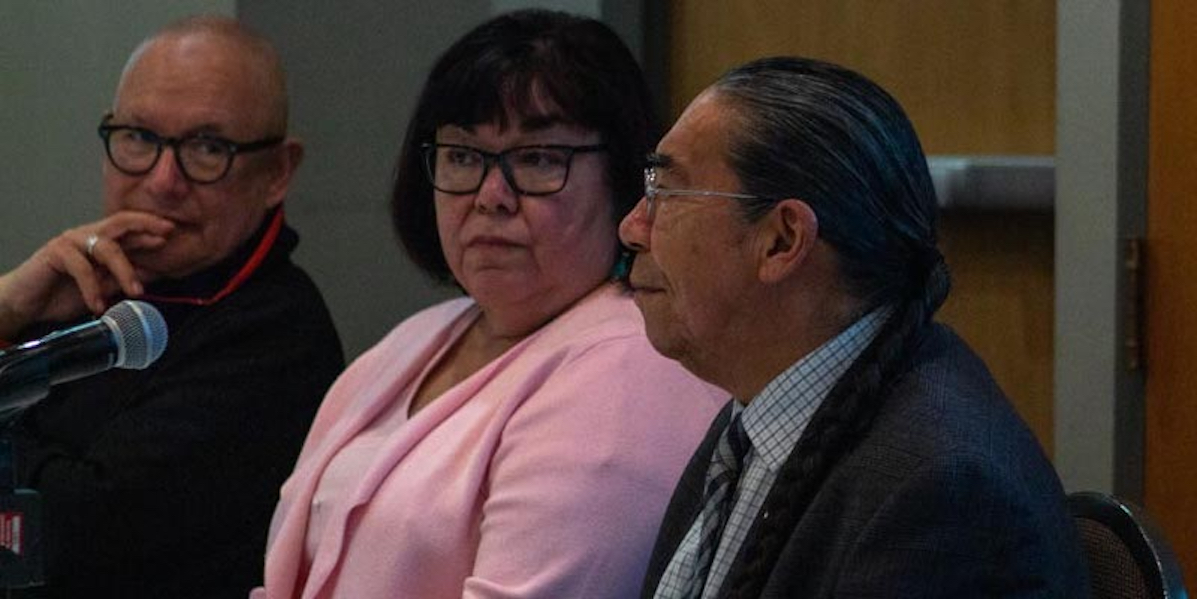For Faculty and Staff

The first priority of Indigenous Resurgence at the Faculty of Community Services is to support Indigenous people. While the Strategic Lead cannot support individual instructors with Indigenizing their curriculum or supporting researchers, there are activities related to supporting programs with recruitment, support for Indigenous students, events held throughout the year and resources on the website that will help you with your efforts to learn about Indigenous people so you can confidently add this to your curriculum.
Indigenous Resurgence at the Faculty of Community Services will focus on student recruitment efforts working the staff at the Faculty of Community Services, Aboriginal Student Services, Admissions and other offices at the University.
Curriculum Ideas and Sources to Support Research
The Missing and Murdered Indigenous Womens and Girls (MMIWG) National Inquiry and Reports have received little attention since the release in June 2019. As part of your responsibility for reconciliation and Indigenization, if you haven’t done so already, print off the MMIWG reports and read all the reports. Consider incorporating this report (external link) into your course content in the Fall/Winter.
Of course, the TRC material is also an excellent resource for your classroom. There are over 5000 pages to choose from. One largely ignored report is the (PDF file) Missing Children and Unmarked Burials Report – Volume 4 (external link)
Canada, Library and Archives. (1996). Report of the Royal Commission on Aboriginal Peoples (external link) .
The Spicer Commission (1991), while including “Aboriginal Issues” specifically the importance of land claims and self-government, the emphasis of this report on Canada (external link) have only two official languages, and two founding people (English and French, not Indigenous Peoples) did little to further Indigenous relations in Canada. Having said that, focusing on the “Aboriginal Issues” noted in this report is important.
A history that is important to understand relating to earlier Indigenous resurgence movements relates to The White Paper (1969) that saw a push by the federal government (PM Pierre Trudeau and then Jean Cretien - Minister of Indian Affairs at that time) to abolish the Indian Act and Treaties and assimilate Indigenous peoples. This historic time in Canada saw Indigenous resurgence and activism mobilize across Canada that led to the withdrawal of the White Paper in 1970 and a counter paper - The Red Paper - written by the Chief of Alberta. The Chiefs referred to the Hawthorne report that emphasized Indians being ‘citizens plus’ and asserted the Treaties and lawful obligations. Whether or not you use this literature in your courses, understanding this important time period is vital to your understanding Indigenous Peoples, identity, sovereignty and resurgence. Here are links to original materials.
(PDF file) Indigenous and Northern Affairs Canada (external link) (1969). ARCHIVED - Statement of the Government of Canada on Indian policy (The White Paper, 1969).
Indian Chiefs of Alberta. (1970). Citizens Plus - (PDF file) The Red Paper (external link) .
Cote-Meek, S. & Moeke-Pickering, T. (2020). Decolonizing and Indigenizing Education in Canada (external link) . Canadian Scholars Press.
Moeke-Pickering, M., Cote-Meek, S. & Pegararo, A. (2020). Critical Reflections and Politics on Advancing Women in the Academy (external link) . IGI Global.
BearPaw Legal. (2015). Understanding Aboriginal Identity.
(PDF file) Terminology Guide: Research on Aboriginal Heritage. (no date). Library and Archives Canada.
Or this one for terminology:
(PDF file) Defining Aboriginal Peoples Within Canada (external link) . (no date). International Journal of Indigenous Health.
Elliott, M. (2018). Indigenous Resurgence: The Drive for Renewed Engagement and Reciprocity in the Turn Away from the State (external link) . Canadian Journal of Political Science/Revue Canadienne de Science Politique, 51(1), 61–81.
National Collaborating Centre for Indigenous Health – Three fact sheets (external link) on a series on racism experienced by Indigenous Peoples of Canada (link to the three fact sheets).
And their website (external link) in general – Publications Section
Belcourt, B.R. (2020). NDN Coping Mechanisms: Notes from the Field (external link) - In NDN Coping Mechanisms: Notes from the Field, the poet takes on the political demands of queerness, mainstream portrayals of Indigenous life, love and its discontents, and the limits and uses of poetry as a vehicle for Indigenous liberation.
The Agenda with Steve Paikin (2017). Indigenous Communities: Surviving Canada (external link) – Creating a Crisis? With Suzanne Stewart, Chief Linda Debassige M’chigeeng First Nation, Tom Flanagan and Frances Widdowson.
Allan, B. & Smylie, J. (2015). (PDF file) First Peoples, second class treatment: (external link) The role of racism in the health and well-being of Indigenous peoples in Canada. Toronto, ON: the Wellesley Institute.
Anderson, M. (2019). Indigenous health research and reconciliation (external link) . Canadian Medical Association Journal. 191(34) E930-931 doi
Logan McCallum, M.J. & Boyer, Y. (2018). Undertreatment, Overtreatment and Coercion into Treatment: Identifying and Documenting Anti-Indigenous Racism. Aboriginal Policy Studies. 2(1).
Logan McCallum, M.J. & Perry, A., (2018). Structures of Indifference: An Indigenous Life and Death in a Canadian City. University of Manitoba Press: Winnipeg. E-book available through Toronto Metropolitan University Library.
The Journey – Documentary about three Indigenous nurses – Canadian Nursing Association.
Canadian Nursing Association. (2014). (PDF file) Aboriginal Health Nursing and Aboriginal Health (external link) : Charting Policy Direction for Nursing in Canada. Ottawa.
Bring Birth Home (2019). (PDF file) Voices from the Indigenous Midwifery Summit.
(PDF file) CAOT Position Statement on OT and Indigenous Peoples Health
Native Women’s Association of Canada. (2018). (PDF file) Accessibility and Disability for Indigenous Women, Girls and Gender Diverse People (external link)